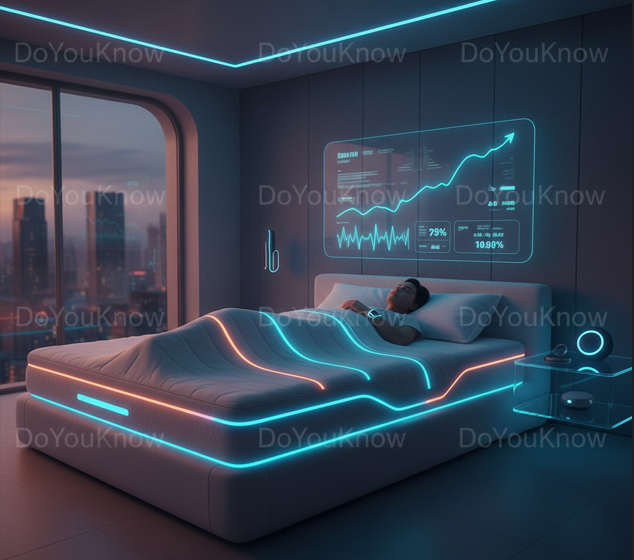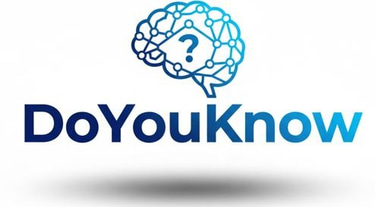Do You Know How Sleep Technology Is Helping People Live Longer
Discover how advanced sleep technology is transforming human health, improving sleep quality, and increasing longevity. Learn how devices, apps, and innovations are helping people live longer, healthier lives.
TECH & SCIENCE
Do You Know Team
9/28/20257 min read


Sleep is the most vital yet often overlooked pillar of human health. Despite its importance, millions worldwide struggle with inadequate or poor-quality sleep, a problem that has escalated in the modern, fast-paced, always-connected world. Chronic sleep deprivation is associated with accelerated aging, cardiovascular disease, weakened immunity, cognitive decline, and shortened lifespan. Yet, while lack of sleep is widespread, so too is the opportunity to transform how we sleep through modern technology.
Enter sleep technology: an evolving field that combines biomedical research, engineering, and artificial intelligence to monitor, analyze, and improve sleep patterns. This convergence of science and innovation is helping people optimize rest, prevent chronic disease, and even enhance longevity. From wearable devices that track every heartbeat to smart mattresses that adjust temperature and firmness, the integration of technology into sleep routines is revolutionizing personal health management.
As researchers uncover more about the connection between sleep quality and lifespan, technology becomes a vital tool. Understanding how to leverage these innovations is no longer optional for those seeking optimal health—it is essential. In this article, we explore the science behind sleep and longevity, the technologies enabling better rest, global research breakthroughs, lifestyle integration, and the transformative potential of these innovations.
The Science of Sleep and Longevity
Sleep is a dynamic, complex biological process with distinct stages, each critical for different physiological functions. It is typically divided into Non-REM sleep (comprising light and deep sleep) and REM sleep (Rapid Eye Movement sleep). Each stage has profound effects on health:
Light sleep serves as a transitional phase, preparing the body for deeper restorative sleep.
Deep sleep is essential for tissue repair, immune system strengthening, growth hormone release, and detoxification.
REM sleep plays a crucial role in memory consolidation, emotional regulation, and cognitive restoration.
Disturbances in these stages can accelerate aging, impair metabolic function, increase inflammation, and elevate risks of chronic diseases. Individuals sleeping fewer than six hours per night are statistically more likely to experience heart disease, stroke, diabetes, and neurological decline compared to those with seven to eight hours of high-quality sleep.
Recent studies link chronic poor sleep with telomere shortening—a marker of cellular aging. Essentially, inadequate rest can physically age the body faster at a cellular level. Conversely, optimizing sleep quality improves metabolic balance, reduces inflammation, enhances cognitive function, and promotes cardiovascular health—all factors contributing to longevity.
Wearable Devices: Tracking Sleep Like Never Before
One of the most transformative advancements in sleep technology is the proliferation of wearable devices. Smartwatches, fitness bands, and dedicated sleep monitors provide real-time, granular data about sleep patterns, physiological responses, and environmental factors.
Modern wearables track:
Sleep duration: Total hours slept and time spent in each sleep stage.
Heart rate variability (HRV): A measure of autonomic nervous system function and recovery.
Respiration and blood oxygen levels: Identifying breathing irregularities like sleep apnea.
Movement patterns: Detecting restlessness, tossing, and turning during sleep.
By analyzing these metrics, users receive actionable insights. Some devices integrate AI algorithms to recommend personalized sleep schedules, bedtime routines, and lifestyle adjustments. For example, the device might suggest earlier sleep based on accumulated sleep debt or recommend breathing exercises before bed to reduce stress and improve REM sleep.
Wearables are not just for personal use—they are invaluable in clinical research. Studies using large datasets from wearables have demonstrated correlations between improved sleep quality and reduced markers of chronic inflammation, cardiovascular risk, and cognitive decline. For individuals striving for longevity, this data-driven approach to sleep optimization is a game-changer.
Smart Mattresses and Sleep Environments
Technology extends beyond wearable devices to the very surfaces on which we sleep. Smart mattresses are designed to improve sleep quality by adapting to body position, temperature, and movement. Key innovations include:
Temperature regulation: Smart mattresses maintain optimal body temperature throughout the night, enhancing REM and deep sleep stages.
Pressure adjustment: Sensors detect body posture and adjust firmness to reduce discomfort and prevent awakenings.
Integrated sleep tracking: Some mattresses provide insights similar to wearables, monitoring sleep stages, heart rate, and breathing.
In addition, modern sleep environments incorporate smart lighting and soundscapes. Exposure to light that mimics natural circadian rhythms helps regulate melatonin production, while tailored soundscapes reduce disturbances and improve sleep continuity. Collectively, these environmental modifications promote deep, restorative sleep, which is directly linked to healthier aging and longevity.
Sleep Apps and Personalized Insights
Mobile applications have become integral to sleep technology. Modern sleep apps analyze data from smartphones and connected devices, providing users with personalized insights and interventions. Advanced AI-driven apps can:
Predict optimal bedtime and wake-up times based on historical sleep data.
Suggest lifestyle adjustments such as exercise timing, meal planning, and screen-time reduction.
Offer guided meditations, breathing exercises, or soundscapes to facilitate sleep onset.
Monitor and provide feedback on sleep disorders like insomnia or sleep apnea.
The ability to translate sleep metrics into actionable behavioral changes is a major breakthrough. By continuously optimizing sleep habits, users experience cumulative benefits for metabolic health, cardiovascular resilience, cognitive function, and overall lifespan.
Medical Sleep Technology and Sleep Disorder Management
Beyond consumer wellness, sleep technology is revolutionizing medical diagnosis and treatment. Sleep disorders such as obstructive sleep apnea (OSA), insomnia, restless leg syndrome, and narcolepsy have profound health implications if untreated.
Medical-grade technology includes:
Polysomnography (PSG): A comprehensive test measuring brain waves, oxygen levels, heart rate, and breathing patterns.
Home sleep tests: Allow patients to diagnose common sleep disorders without hospital visits.
CPAP and BiPAP devices: Provide continuous positive airway pressure to keep airways open in OSA patients.
Smart oral appliances and neurostimulation devices: Offer alternative treatments for specific disorders.
Effective management of sleep disorders prevents cardiovascular strain, metabolic dysfunction, and cognitive decline, directly contributing to increased longevity.
Circadian Rhythm Optimization
Sleep is intimately tied to circadian rhythms, the body’s internal 24-hour clock. Disruptions in these rhythms, caused by irregular schedules, shift work, or exposure to artificial light, accelerate aging and increase disease risk.
Sleep technology supports circadian alignment through:
Timed light exposure: Mimicking natural daylight cycles to synchronize sleep-wake patterns.
Sleep tracking insights: Identifying irregular patterns and recommending interventions.
Lifestyle integration tools: Coordinating exercise, meals, and work schedules with biological rhythms.
By restoring proper circadian alignment, individuals experience improved metabolic regulation, hormone balance, and cardiovascular health—all factors that enhance longevity.
Lifestyle Integration and Longevity
Sleep technology is most effective when integrated into broader lifestyle strategies:
Diet: Timing of meals and consumption of sleep-promoting nutrients (like tryptophan and magnesium).
Exercise: Regular physical activity improves deep sleep quality.
Stress management: Mindfulness, meditation, and relaxation techniques reduce cortisol levels and enhance sleep.
Screen management: Limiting blue light exposure before bed improves melatonin production.
Comprehensive programs combining technology and lifestyle interventions maximize the health benefits of restorative sleep. Longevity studies increasingly demonstrate that consistent sleep hygiene, supported by technological tools, is associated with slower aging, lower disease incidence, and longer lifespan.
Global Research and Innovations
Sleep technology is rapidly evolving worldwide. Key innovations include:
Oura Ring, Fitbit, and Withings: Consumer wearables providing detailed sleep analytics.
Eight Sleep Pod and Sleep Number 360 Smart Bed: Advanced mattresses with temperature and pressure regulation.
AI-powered sleep apps: Offering predictive analytics and behavioral interventions.
Medical research collaborations: Universities and hospitals studying sleep interventions and their impact on aging.
Clinical trials indicate that individuals using these technologies consistently experience improved sleep quality, enhanced cognitive function, and measurable improvements in biomarkers associated with longevity.
Case Studies and Real-World Examples
Oura Ring users report improved sleep duration and deep sleep stages, correlating with reduced heart rate variability stress markers.
Eight Sleep Pod installations in corporate wellness programs have decreased employee fatigue and improved productivity, indirectly supporting long-term health.
CPAP adherence studies in sleep apnea patients show reduced cardiovascular events and improved survival rates over ten years.
These examples highlight the tangible benefits of sleep technology, demonstrating that consistent monitoring, personalized interventions, and proper management of sleep disorders can enhance both quality of life and longevity.
Challenges and Considerations
Despite advancements, several challenges remain:
Data privacy and security: Wearables and apps collect sensitive health information.
Accuracy variations: Consumer devices are improving but still less precise than clinical equipment.
Accessibility: High-quality sleep technology may be cost-prohibitive for some populations.
Behavioral adherence: Technology is effective only if individuals follow recommendations consistently.
Researchers and developers are addressing these challenges through improved algorithms, regulatory oversight, and integration with healthcare systems.
Future Trends
The future of sleep technology promises even greater impact on longevity:
AI-driven predictive sleep optimization: Personal recommendations based on lifelong data.
Integration with genomics and personalized medicine: Tailoring sleep interventions to genetic profiles.
Smart home ecosystems: Coordinated control of lighting, temperature, and noise for optimal sleep.
Global collaboration in longevity research: Combining data from wearables, medical devices, and lifestyle studies to create holistic interventions.
These trends suggest a future where personalized, technology-assisted sleep management is a cornerstone of preventive health and longevity.
FAQ – Frequently Asked Questions
Q1: Can technology really help me sleep better and live longer?
A1: Yes. Studies show that wearable devices, smart mattresses, and AI-driven interventions improve sleep quality, which is linked to longer lifespan and reduced chronic disease risk.
Q2: What is the best sleep technology for longevity?
A2: Devices and apps that monitor sleep stages, detect disorders, and provide personalized guidance are most effective. Smart beds complement these devices for environmental optimization.
Q3: How does sleep affect longevity?
A3: Sleep affects cardiovascular health, metabolism, immune function, and cognitive performance. Consistently poor sleep accelerates aging and disease.
Q4: Are wearable sleep trackers accurate?
A4: Modern wearables provide highly accurate tracking of sleep stages and physiological data, though clinical devices offer more precision.
Q5: Can technology replace medical consultations?
A5: No. Sleep technology is complementary. Individuals with suspected sleep disorders should consult healthcare professionals for diagnosis and treatment.
Conclusion
Sleep is the cornerstone of health, and technology is empowering individuals to optimize it like never before. Wearable devices, smart mattresses, AI-driven apps, and medical interventions provide detailed insights and actionable recommendations, helping people achieve restorative sleep.
By improving sleep quality, addressing disorders, and aligning with circadian rhythms, sleep technology reduces the risk of chronic diseases, supports cognitive function, and enhances overall longevity. Global research continues to expand, refining interventions and integrating personalized approaches for maximum benefit.
Investing in quality sleep, supported by technology, is an investment in a longer, healthier life. As these innovations evolve, they promise to redefine how we approach aging, health, and well-being, making the dream of living longer not just possible, but achievable.
#SleepTechnology #Longevity #WearableDevices #SmartMattress #SleepOptimization #CircadianRhythm #HealthTech #SleepTracking #AIInHealth #QualitySleep #DoYouKnow #WellnessInnovation #LiveLonger #SleepScience
Knowledge
Empowering minds with reliable educational content daily.
Newsletter Signup
© 2025 DoYouKnow. All rights reserved.
Stay Ahead of the Trends – Join Our Newsletter
